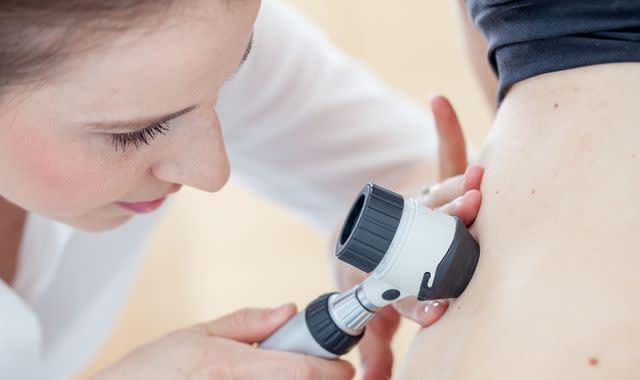Melanoma skin cancer cases at all-time high in UK

Melanoma skin cancer cases in the UK are at an all-time high, with 20,800 people expected to be diagnosed this year.
Cancer Research UK says rates of melanoma - skin cancer that can spread - have increased by almost a third over a decade.
Rates have increased from 21 to 28 per 100,000 people between 2007-2009 and 2017-2019.
New analysis has found the upward trend in cases can be seen across all ages, but the biggest rise has occurred in adults over 80 - a 57% rise in cases over the past decade.
In those aged 25 to 49, there was a 7% increase.
Cancer Research UK said around 17,000 melanoma cases every year are preventable, with almost nine in 10 caused by too much ultraviolet (UV) radiation.
UV from the sun, or sunbeds, can damage DNA in skin cells and cause skin cancer.
The charity advises people spend time in the shade, especially between 11am and 3pm; cover up with clothes, a wide-brimmed hat, UV-protection sunglasses and a sunscreen with at least SPF 30 and 4 or 5 stars, applied often.
One of those diagnosed with skin cancer, after spotting a tiny blemish above her knee, is Shrewsbury postmistress Caroline Jones.
Ms Jones first visited her GP after spotting a tiny mole-like blemish on her leg in July 2018.
She told Sky News: "I noticed a tiny but strange mole-type thing, about half the size of a penny, just above my knee on my right thigh and decided I ought to get it checked at the doctors."
The 57-year-old, who is all too familiar with the dangers of cancer after her mother died aged just 49, is urging people to get their skin checked if concerned.
She said: "I sat in the waiting room looking at the pictures on the wall and I could see that my skin looked just like one of the photographs - flat and shiny and black in the middle.
"My mum died of breast cancer when she was just 49 and here was I, aged 52. I honestly thought I was going to die."
The biopsy found it was cancerous two weeks later, before Ms Jones had the mole removed without needing further treatment.
Cancer Research UK's chief executive, Michelle Mitchell, said: "Survival from cancers including melanoma continues to improve, demonstrating the substantial progress made possible by research.
"But it's vital that people try to reduce their risk of getting the disease in the first place.
"Make sure to take care in the sun and contact your GP if you notice any unusual changes to your skin - whether a new or changing mole, a sore that doesn't heal, or an area of your skin that looks out of the ordinary.
"Spotting cancer early can make all the difference."
More people surviving
Figures from the charity show, however, that more people are surviving melanoma, with deaths expected to continue to fall.
Almost nine in 10 adults diagnosed with melanoma in England will now survive their disease for a decade or more.
According to the charity, younger people are more aware of the link between the sun and skin cancer than those who are older, who may have taken advantage of the "cheap package holiday boom" from the 1960s onwards.
Other factors driving up cases include a growing and ageing population and improved awareness of the symptoms of skin cancer.
Read more:
Too many patients waiting too long for cancer treatment, data shows
Proteins in blood 'could warn of cancer seven years before diagnosis'
Dr Claire Knight, senior health information manager at Cancer Research UK, said: "Getting sunburnt just once every two years can triple the risk of developing skin cancer, compared to never being burned."
Last month, experts told how the world's first personalised mRNA cancer jab for melanoma, which also has the potential to stop lung, bladder and kidney cancer, is being tested in British patients.
The "gamechanger" jab, which offers hope of a cure, is custom-built for each person in just a few weeks.
A stage-2 trial of the jab, involving pharma firms Moderna and MSD, found it dramatically reduced the risk of the cancer returning in melanoma patients.
A final phase-3 trial is now running, led by University College London Hospitals NHS Foundation Trust (UCLH).

 Yahoo News
Yahoo News 